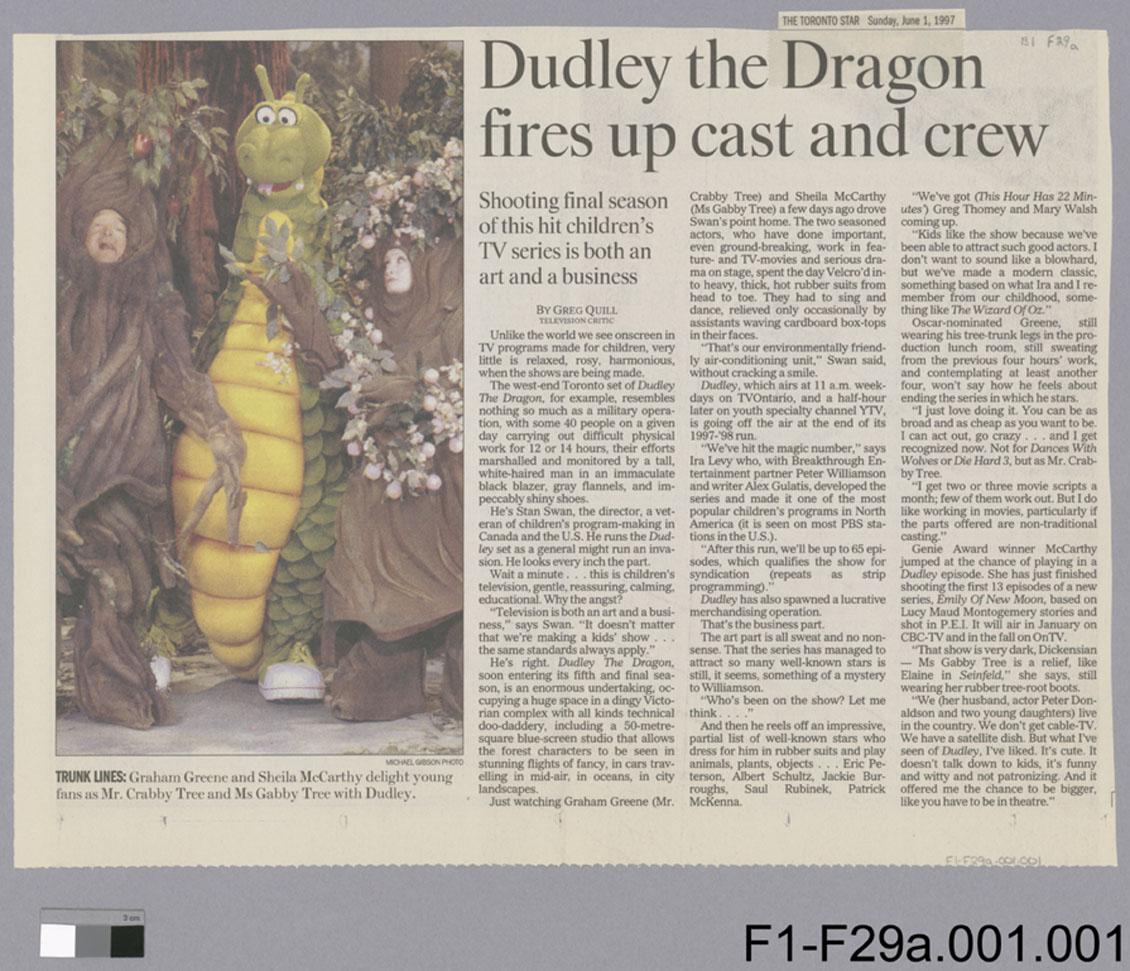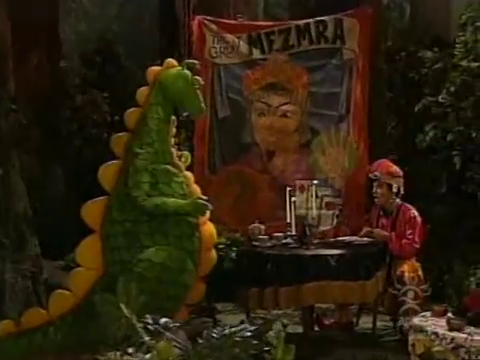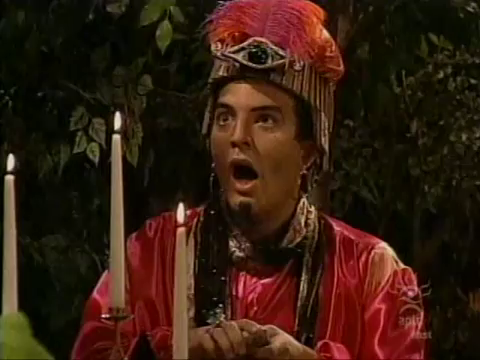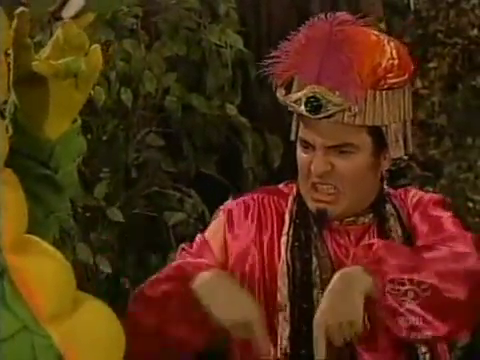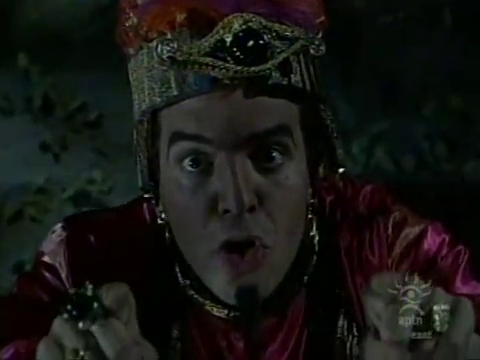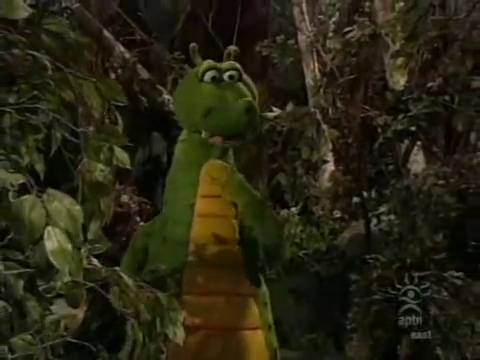Deal with the Devil
“As luck would have it, Dudley came across a mysterious fortune teller.”
The Great Mezmra is astonished to see this big green rarity of nature. And he’s delighted. He vigorously shakes Dudley’s right hand (which is interesting, since the body puppet’s right hand is usually dysfunctional).
Dudley asks Mezmra if he’s seen another dragon. “I’d give anything to find another dragon,” Dudley says. One can almost see the wheels turning in Mezmra’s mind.
Thinking quickly, Mezmra says he knows where the dragons really are. If he tells Dudley, what does Dudley offer in return?
A dragonberry bush? No. Two dragonberry bushes? Uh-uh. Poor Dudley has nothing else. He had given away his precious teddy bear in the previous episode, and his Big Red Car is long gone. All Dudley has is himself.
Perfect! That’s what Mezmra really wants! A dragon for his circus!
Dudley wants to see his dragon friends, more than anything. He agrees to join the Great Mezmra.
So where are the other dragons?
Here, Rick Mercer’s performance as Mezmra is brilliant, as he flails around for an answer, doing an act around his crystal ball. His answer: On the other side of the moon, of course. How does Dudley get there? Well – the con artist improvises – Dudley will have to walk until he’s close enough to reach up and touch the moon. Dudley has three nights to find his friends. After that, he belongs to Mezmra.
There’s another condition: Don’t tell any of your little friends. Why? Because dragons are shy and his friends might scare them away.
“Good thinking,” the dragon says. And off he goes. But not before thanking the fortune-teller. Such a nice, polite dragon, that Dudley. Such a stupid, gullible dragon, that Dudley.
Crafty devil, that Mezmra.
Photos © Breakthrough Entertainment Inc.
The Great Mercer
 Peter Williamson and Ira Levy of Breakthrough Films and Television wanted comedian Rick Mercer to host their new TV series, It Seems Like Yesterday. At the time, Mercer had gained a reputation from his stage plays and a CBC TV series, This Hour Has 22 Minutes (1993-2001). Williamson said, “Although Rick’s in his 20s, he has such a droll sense of humor and is such a vital kind of Canadian that he’s the perfect host for the show.”
Peter Williamson and Ira Levy of Breakthrough Films and Television wanted comedian Rick Mercer to host their new TV series, It Seems Like Yesterday. At the time, Mercer had gained a reputation from his stage plays and a CBC TV series, This Hour Has 22 Minutes (1993-2001). Williamson said, “Although Rick’s in his 20s, he has such a droll sense of humor and is such a vital kind of Canadian that he’s the perfect host for the show.”
“I like getting paid to learn things, so the history show sounded pretty good,” Mercer told Christopher Harris of the Canadian Press. “Then they mentioned that they also did Dudley the Dragon, and I said, ‘Well, I’d really like to do Dudley the Dragon.'”
And so he did. Mercer played The Great Mezmra, the flamboyant fortune-teller.
“I think I got to play the only character on Dudley never to see the error of his ways. So it was very appealing.”
Yes, indeed. And Mercer’s performance was appealing enough that in October 1998, he won a Gemini for Best Performance in a Pre-School Program or Series.
Source: Christopher Harris, (Canadian Press)–Kingston Whig – Standard. Kingston, Ontario, November 4, 1997, “Popular Funny Man Broadens Horizons,” pg. 22.
Mezmra photo © Breakthrough Entertainment Inc.
Lo, There Shall be … a Villain!
Dudley was the last dragon.
Dudley’s quest was to find another dragon.
In the world of Dudley the Dragon, this would be an easy accomplishment. The forest was magical. It had Chloe, a fairy godmother. It had at least two wishing wells. Dudley could wish on a shooting star or pick a four-leaf clover. A genie was on the loose. The Troll could spin a spell. The Pumpkin King could grant the wish. Or Mother Nature could tell him, as could Grandpa Robin, who’s been around the world “seven times plus two.”
But no, this was the final episode. Time to get tough. Time to give our hero one last challenge. One that would be insurmountable.
For the sake of drama, Dudley needed something to hinder him in his quest. He needed someone who would give him a challenge, someone who would raise the stakes, someone to force him to pay a terrible price for his fondest wish. He needed … a villain.
But wait. This was the world of Dudley the Dragon. In it, “Our villains are misguided rather than evil,” said Jean Morphee-Barnard, the show’s educational consultant. She had been involved with Dudley since The Conserving Kingdom, all the way to “The Last Dudley.”
A misguided villain? Not this time.
Prior to this story, Alex Galatis had written a trilogy of episodes involving a couple of witches. One of those episodes, “The Pumpkin King”, was a takeoff of The Wizard of Oz. Galatis was likely inspired by the character of Professor Marvel, the fortune-telling con man.
Dudley’s nemesis would be a fortune-telling con man, albeit one far more menacing than Marvel. His name: The Great Mezmra.
Who would play the role? Who would be the final special guest star of the series? Who would give Dudley a run for his size 13 triple E sneakers?
Source: Justin Smallbridge, Maclean‘s, February 19, 1996, “Dudley is No Dud; Children Love the Goofy Canadian Dragon,” p. 62.
Dreaming of Dragons
Usually song-and-dance routines, when placed in a drama or comedy, are intrusive. They interrupt the narrative. They suck you right out of the story. The “fourth wall” is broken and viewers become aware that, “Oh, it’s just a TV show.” It’s for good reason they are called “showstoppers.”
In Dudley the Dragon, the stories were like a musical stage production. Every episode featured two, three, or sometimes four musical numbers. The song-and-dance routines were just that—routine. It was fun and frivolity for the younger viewer.
Not this time. This episode was more straightforward than its predecessors.
In this case, “Dreaming of Dragons”* meshed unobtrusively with the narrative. Here, Dudley is pining away for another dragon, in song. Kirk Dunn’s movements and Alex Galatis’s singing, as Dudley, expose the very heart of the character.
What makes the sequence all-the-more special is that it’s one long camera shot. No cuts. No flashy special effects. Nothing distracts from the mood. So smooth is the camera tracking, viewers may not be aware of its movement. We are completely focused on the character and what he’s feeling. Which is how it should be.
As Dudley walks forward, the cameraman is constantly stepping back, panning and tracking with Dudley, all the while keeping him properly framed while he, himself, avoids the trees and bushes and wires in the studio. While unremarkable and virtually unnoticed by the viewer, it’s an amazing shot.
How was it accomplished? Apparently, by means of a jib, which is a boom device mounted on a mobile tripod. It has a camera on one end and a counterweight and controls on the other. It allows for smooth tracking shots from various angles. See here for details.
So here’s a salute to those responsible:
Director Steve Wright.
Camera operators Ted Hart and Alfie Kemp.
Jib operator Wojtek Kozlowski.
Camera assistant Matthew Andrews.
and to Kirk Dunn and Alex Galatis for a fine performance.
Photo © Breakthrough Entertainment Inc.
*Actual title, “Somebody Like You”
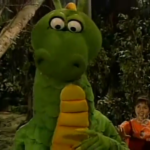
The Departure
As Dudley begins his quest, Sally calls out to him.
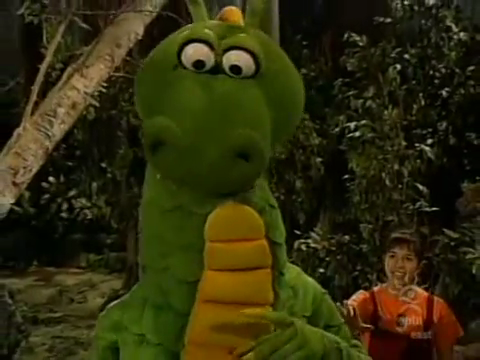
He stops, and the two friends share a poignant moment.
“It’s good to see you again,” Sally says.
Actress Asia Vieira says the words with great sincerity, and warmth. She knows that after five years, this is the last time she’ll be interacting with this big, lovable goofball. Her emotion comes across as genuine. It’s a powerful, heartfelt moment.
Credit, here, should also go to Alex Galatis, who wrote the episode. Any lesser writer would have had Dudley galumph off without this exchange between these two longtime friends.
We, the viewers, now have strong reason to root for Dudley. The love between friends gives us reason to care, and stay tuned for what happens next.
Such is the real magic behind Dudley the Dragon.
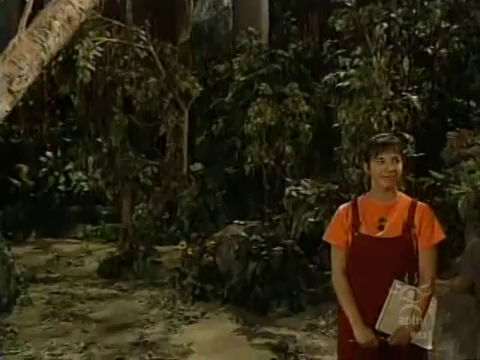
Photos © Breakthrough Entertainment Inc.
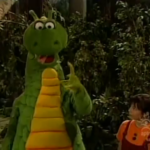
Dudley’s Quest
Sally notes the dragon’s sad mood and asks what’s wrong.
Dudley is lonely. He wants to find another dragon for companionship. He asks Sally if she knows of any real dragons, like him.
“No,” she says, “You’re the only one.”
“That’s the prob-a-lem. I don’t want to BE the only one.”
Sally asks him if he’s ever gone looking for another.
“Not really,” Dudley says. “Do you think I could find him?”
“Well, if anyone can, you can,” Sally says. She knows. Anything can happen in Dudley’s world.
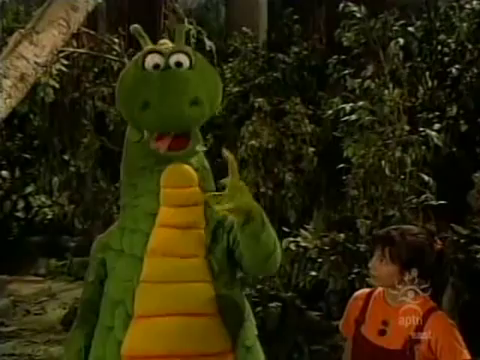
“Then I’ll do it,” Dudley declares. “I’ll find that last dragon if it’s the last thing I ever do.”
Indeed, it is the last thing he ever does. It’s the final episode.
Photos © Breakthrough Entertainment Inc.
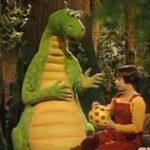
A Reunion with Sally
“Once upon a time there was a dragon. He had many friends and many more adventures.”
Thus began the final adventure of Dudley the Dragon.
The words came from Dudley’s young friend Sally, the first human he met when he woke up in the 20th century. The series began with Sally narrating from a book, “Once upon a time there was a dragon …” It was fitting that, five years later, Sally would narrate the end of the series.
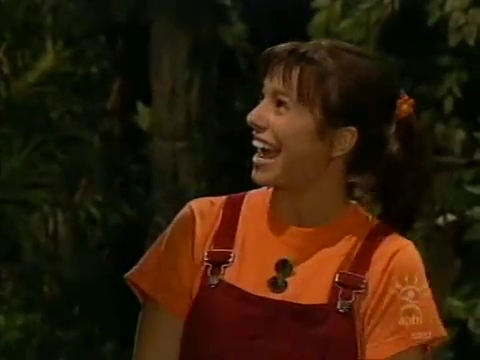 Dudley’s in a sad mood, but perks up when he sees his long-time friend again. Sally, likewise, is thrilled to see Dudley.
Dudley’s in a sad mood, but perks up when he sees his long-time friend again. Sally, likewise, is thrilled to see Dudley.

She’s still wearing red overalls as she has since the first episode, and a couple buttons have been added to the shirt.
“Look at you. You’re all grown up,” Dudley says. It’s been five episodes since we last saw her, but hey, time passes.
The moment is a touching one, and genuine.
The Last Dudley
For Dudley‘s cast and crew, filming the final episode must have been a sad occasion. For five years they had worked together on a show that brought joy, and education, to millions of youngsters. The actors had honed their roles to a “T,” knowing their characters thoroughly, and how they related to each other. The crew at Lansdowne Studios had developed their routine to peak efficiency. One can only imagine the friendships and camaraderie that prevailed.
As early as Season One, the mood on the set was described as “delightful.” A studio cameraman observed, “This production has brought out the kid in all of us.”
Add to that, the times when Canada’s finest thespians would guest star on the show, what a boost to morale that must have been. Or the pride the filmmakers must have had for a job well done, despite time constraints and a limited budget. Their work had been honored earlier in the year, in February, at the 11th Annual Gemini Awards, in which The Adventures of Dudley the Dragon won Best Children’s Program or Series.
Now, it was all coming to an end.
This was it. The final episode. The last Dudley.
What would happen to the dragon and his friends? Would it be a clip show highlighting the previous adventures? Would Dudley O.D. on dragonberries again, fall asleep for another hundred years, and discover a vast change in the environment? Would Mr. Crabby Tree turn over a whole new leaf?
No. The final episode would be far more special.
Source: Kathy Kastner, Toronto Star, October 2, 1993, “He’s No Dud,” Section C, pg. SW4.
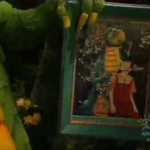
Laura! What th- ?
“Dudley’s Big Decision” began Season 5. It’s a significant episode, for a couple of reasons. First, it reaffirmed that Laura (Andréanne Benidir) and Dudley were best friends with each other. Second, it dealt with the topics of free will, personal choice and true friendship. Laura was supposed to leave the forest with her family, but Dudley wanted her to stay, and, through the use of a magic charm, imprisoned her in the forest. Ultimately, the spell backfires and Dudley has to let her go. Laura leaves to join her family on the East coast.
But was it supposed to be Laura?
Dudley sings a song, “I Don’t Want to Lose My Friend”, holding a picture of himself and – well, see for yourself:
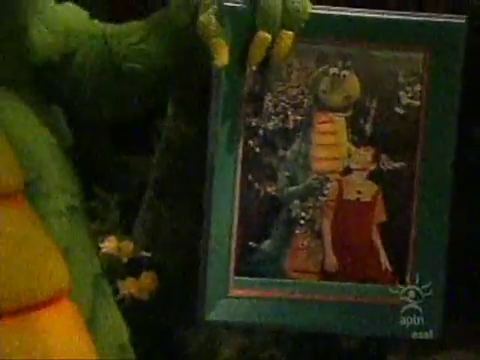
© Breakthrough Entertainment.
That’s a second-season picture of Dudley and Annick, from the Christmas special! Annick, you’ll notice, is wearing the same costume and hair style as Sally.
Who’s Annick? She was the French-speaking counterpart to Sally, in the French-language version, Les aventures d’Arthur le Dragon. Annick was played by Andréanne Benidir. The French version lasted for the show’s first two seasons. Andréanne appeared late in the show’s third season, as the English-speaking Laura.
Could it be that Laura was meant to be Sally, that this was written to be Sally’s formal exit from the series?
Regardless, it was filmed with Laura, who left the forest at the end. But not for long. She came back four episodes later in “The Wishing Well.”
But Laura and Sally finally meet face to face. In “The Great Dragonberry War,” Dudley is quibbling with Caveman over a dragonberry bush. Both claim the bush; neither will share. Laura sides with her best friend Dudley; Sally sides with Caveman. Who survives? Certainly not the dragonberry bush. But they’re all pals by story’s end.
In total, Laura appeared once in the third season, three times in the fourth season, and six times in the fifth season.
Sally appeared only twice in the fifth season. Her second appearance would be a special one. It was in the final episode.

The Magic Number
In 1995, Breakthrough Entertainment and its licensees were busy grooming Dudley the Dragon to be a long-term franchise. The character would generate sales in merchandise, which in turn would cross-promote the show. Hypothetically, the revenue would then recycle back into making new episodes.
This was the philosophy of George Lucas. He invested his profits from American Graffiti to jumpstart Star Wars. He used his Star Wars profits to make The Empire Strikes Back. He used Empire‘s profits to make Return of the Jedi and build Skywalker Ranch. And that led to more Lucasfilm productions. Star Wars has been an active franchise for over 34 years, with no end in sight.
CBC TV reporter Howard Green acknowledged, “The strategy is to make Dudley an evergreen character, like Big Bird of Sesame Street, on the air for more than 25 years. The producers say the key is to protect Dudley’s soul. Dudley’s last name could be Do-right. He’s politically correct.”
“It’s the social value of a TV show like Dudley that will make it a long-lasting thing,” said Dudley‘s executive producer Peter Williamson. “Whether the licensing goes on with it is another thing.”
According to John McCay of the Canadian Press, sales of Dudley merchandise would reach U.S. $500 million in 1996.
In February 1996, the Toronto Star had announced a Dudley feature film was being written. In June, John McCay reported that funding for the film had already been arranged. Playback announced the earliest possible release could be Christmas 1996.
The project fizzled, for reasons unreported.
In June and July of 1997, production commenced on the fifth season of Dudley the Dragon.
It would be the last season.
Why?
Executive producer Ira Levy explained, “We’ve hit the magic number. After this run, we’ll be up to 65 episodes, which qualifies the show for syndication.”
And so, The Adventures of Dudley the Dragon, which appealed to kids of all ages, ended with 65 episodes.
Barney and Friends, which appealed to kids 0 to 2, has reached 261 episodes plus a feature film.
Something’s wrong with the math, isn’t there?
Sources: Greg Quill, Toronto Star, June 1, 1997, “Dudley the Dragon fires up cast and crew Shooting final season of this hit children’s TV series is both an art and a business,” pg. B8; Mary Ellen Armstrong, Playback, June 16, 1997, “Ontario Scene: Klein Spins Mystery for Stornoway, Quirky Comedy for Endeavor” ; Sid Adilman, Toronto Star, February 11, 1996, “Canadian Shows Winners With Kids; Popular TV characters Spark Merchandising Spinoff Frenzy,” p. E7; John McKay, The Vancouver Sun, June 29, 1996, Dudley Does Right in U.S. Market,” p. C12; Howard Green, Venture – CBC Television, Toronto, October 15, 1995; Mary Maddever, Playback, January 15, 1996, “Special Report: NATPE ’96: Our Kids’ Series Big Game in the U.S.”; imdb.com.
